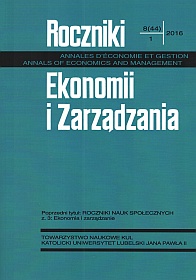Local Currencies in the Times of the Crisis
Abstract
For a long time the problems of the existing financial system have been raising discussions which concentrate on searching for solutions offering greater effectiveness in alleviating the effects of more and more frequently reoccurring crises. The never-ending financial crisis, which began in 2007, and a way to cope with the risk of bank insolvency by the state debt buy-out not only threatens the economy but also undermines the trust to public institutions. In the face of increasing problems, we speak more and more often about the reconstruction of the global financial system, yet simple solutions do not come up. The events of the recent years show that the society, more and more aware of the disease and the consequences resulting from the existing financial system, is looking for solutions which would enable surviving in the crisis situation. One of such ideas are alternative local currencies. The idea itself is nothing new as they have been functioning in many countries for years, but as their historical prototype one may consider solutions adopted during the Great Crisis of the 1930s in the town of Wörgl in Austria.
The aim of the article is to present the importance of local currencies in overcoming an economic crisis against the background of historical events, as well as today. Today’s local currencies have become popular in many European countries, although their construction and possibilities differ both historically and nationally.
References
Baj L.: Interview with z Benoît Cœuré, ECP Board Member, “Gazeta Wyborcza” 16 May 2014,
https://www.ecb.europa.eu/press/inter/date/2014/html/sp140524_1.pl.html
Bankkunden müssen zahlen. Erstmals Negativzinsen auf Tagesgeld http://www.faz.net/aktuell/finanzen/meine-finanzen/sparen-und-geld-anlegen/bankkunden-zahlen-erstmals-negativzinsen-auf-tagesgeld-13237202.html
Chiemgauer: Startseite, http://www.chiemgauer.info/
Deutsche Bank rechnet mit Negativzinsen für Privatkunden http://www.faz.net/aktuell/finanzen/geldanlage-trotz-niedrigzinsen/geldanlage-deutsche-bank-rechnet-mit-negativzinsen-fuer-privatkunden-13243347.html
Dobry, Polska Waluta Lokalna, www.dobry.org.pl, 2014
Echevers P.H.: J. Silvio Gesell, Die Revolution des Geldsystems, Königswinter: LULU Press Enterprises 2013.
Gesell S.: Die natürliche Wirtschaftsordnung, 9. Aufl., hrsg. von K. Walker, Lauf bei Nürnberg: Rudolf Zitzmann Verlag 1949 [HTML von Wolfgang Röhrig, Juli 1997, PDF von Florian Seiffert, August 2003].
Kisiel M.: Niekartowe schematy płatności bezgotówkowych na świecie, Kierunki rozwoju, wybrane przykłady, Wrocław University of Economics, 2013, https://www.nbp.pl/systemplatniczy/obrot_bezgotowkowy/niekartowe-swiat.pdf
Mennen A.K.: Regionalwährungen: Mit Chiemgauer gegen den Euro-Crash, Spiegel-Online Wirtschaft [06.08.2012].
Nowy pieniądz w Polsce. Od dziś „Zielony”, www.money.pl [05.02.2015].
Ogólnie o projekcie waluty lokalnej Zielony, www.zielony.biz.pl [2015].
Przyłuska J.: W poszukiwaniu nowych rozwiązań dla systemu finansowego, „Studia i Prace Kolegium Zarządzania i Finansów” 2013, z. 128.
Przyłuska-Schmitt J.: Współczesne alternatywne formy pieniądza wobec pieniądza narodowego, in: Wybrane problemy i wyzwania gospodarcze. Ujęcie interdyscyplinarne, ed. A. Zimny, Konin: WSH PWSZ w Koninie 2015.
Report, Virtual Currency Schemes, European Central Bank, Eurosystem, Oktober 2012 pdf
Regionalentwicklung.de: Wir entwickeln Regionen, http://www.regionalentwicklung.de/regionales-wirtschaften/regionalgeld/.
Copyright (c) 2016 Roczniki Ekonomii i Zarządzania

This work is licensed under a Creative Commons Attribution-NonCommercial-NoDerivatives 4.0 International License.


